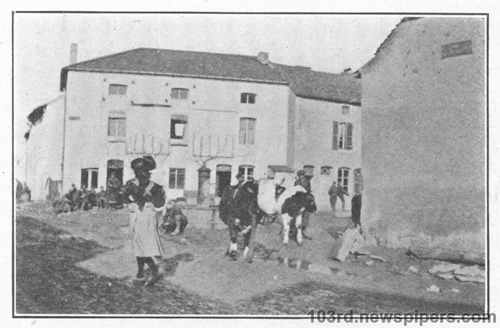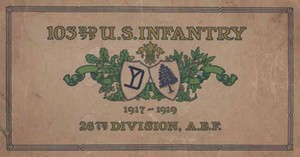 |
CHAPTER II
OVERSEAS
O(J'l`()BElt lst saw the convoy all iogether and from then on it was ship lifc
for nine days. There were boat drills each day, setting-up exercises,
inspection of the men and quarters, elHeers’ and noneommissioned ofi‘icers’
schools, guard duty; withal the voyage passed quickly. The ships changed
direction, the convoy varied its formation and manoeuvred enough to keep up
interest and speculation. Of course the men were crowded, perhaps the food
was not over abundant, but those things are forgotten. No subinariues were
encountered, though a considerable sense of relief was felt when, arriving in the
danger zone at ten o'cloek the morning of October 7, the convoy was picked up
by the Hotilla of submarine chasers which was to guide and guard the way into
Liverpool. Veritable watchdogs, these little boats with their carnoufiaged sides,
seemed literally to bob up from all sides at once, forming a cordon of safety.
Land was sighted on the morning of the eighth, and the lighthouse at the outer
entrance to Liverpool harbor was passed about noon on the ninth. Ono at a.
time the ships drew into their docks; the 2nd Binttahon debarked on the ninth,
the 3rd Battalion at 3 a. ru. on the tenth, and the lst Battalion and Headquarters
at nine o’cleck on the tenth. The unloading of men, barracksdaags, and other
baggage went through swiftly. For the heavy and bulkier freight a baggage
detail was left.
Headquarters, the lst and 2nd Batialions, entrained for Borden, the 3rd Bat-
talion for Southampton.
The trip from Liverpool was made in passenger coaches and was very interest-
ing, for the route passed through some beautiful country and through cities and
villages famous in literature, history, and industry. For the first time our men
saw girls and women‘ doing men’sj work. The general impression was of a
country busy at work for some great end. Near Winchester our first Hospital
Train was seen.
The troops going to Borden went into Oxney Camp, Borden lzlaunts, near
Kingsley, the battalion going to Southampton, to the rest camp on the heights
outside the city limits. All were under canvas. Though Borden and Southampton
are some miles apart, both are situated in southern England, the latter, South·
ampton, being one of England’s largest ports and an cmbarkation and debarkation
point for channel traflie.
The stay of the regiment in England was a short one but not without value.
The men rubbed shoulders with Tommies, Cmmdians, Aiistrulimis, New Zeal:md—
ers, and picked up some information from men who had been "therc." They saw
what it meant, at nation at war, reflected in life about them; women doing meifs
work, restrictions 011 food and food allowances, cities in total darkness at night.
Then, too, they learned im little of English history from their wandering; to historic
 places. The weather was bad, rain and more rain, which meant mud.] The
ration situation was a difficult one as was also the housing of the men. Taken all
in all, knowing too that their training was not to be received in England, all were
glad when the next inove was made across the Channel.
_ The 3rd Battalion crossed on the night of the lGth-17th; the 2nd, on that of the
l9th—20th; the lst Battalion, the 20th—2lst. The crossing was made on fast
ehannel boats and was "usually rough." All troops landed at Le Havre, a
tremendous center of activity, for it was one of the principal debarkation ports.
There were located large Britisli rcst camps and prison camps. Our troops, how-
ever, spent less than twenty-four hours there; each unit moved out the night
following its arrival, and then it was that the rncn had their first troop-train ride,
after the manner of veterans, in box ears, “(`hevaux 8, Hoinincs 40," lt was a
hard but interesting trip lasting two nights and a day. Liffol—le—Grand, which
was to be thc home and training area of the regiment until February, was reached
the second morning after leaving Le Havre. Along the route the reception of thc
French was typically enthusiastic. The struggle that France was going through
seemed to he reflected on the land and the people, for it must be remembered
that northern and western France were paying dearly. The war was very near
to them not only from the lives lost but from the resultant tying up of industry
and agriculture. ·
Liffol-le-Grand is a village of fifteen hundred inhabitants, situated in the
Department of the Yosges. Ncufchateau, the nearest city of any considerable
size, and Division Headquarters during the divisienls stay in the area, lies ten
kilometers to the north on the Meuse River. Chaumont, General Headquarters,
is about forty kilometers to the south. The nearest part of the line, the Toul
front, from which occasionally the artillery could be heard, was to the northwest
about forty-five kilometers, The village of Liffol»le-Grand is old, dating back
to the period of Roman influence if not of Roman rule. The main road, Route
Nationale, which passes through thc village from Chaumont to N eufchateau is
said to have been built by the Romans. Vvlith its houses all of stone, built right
out to the streets and roads, its men, women, and children with their noisy wooden
shoes, its sheep, goats, cows, hens, chickens roaming at will in the streets, this
village presented a strange contrast to the "homc villages " of New England men.
Brigade and Regimental Headquarters, the Headquarters and Supply Com-
panies, the lst and 3rd Battalions, and the Maehine—Gun Battalion were billeted
at Liffol. The second battalion and one machine—gun company went to Villouxel,
a small village about three kilometers distant. For the most part the men were
billetcd in stables and lofts; ofhcers were lodged with the villagers. Some of the
companies did, however, have Adrian barracks for their mess-halls. There were
no young men left in the village, a few middle-aged men were all that remained,
and the women and children. Beforc the war (and how often that expression,
avant La Gacrre, was heard) the district was fairly prosperous, farming and the
making of wooden shoes, and beautiful and high»grade chairs, and cabinet work
being the principal industries. The welcome of these people was genuine; they
received thc 103rd Regiment into their homes and hearts and have kept them
there.
places. The weather was bad, rain and more rain, which meant mud.] The
ration situation was a difficult one as was also the housing of the men. Taken all
in all, knowing too that their training was not to be received in England, all were
glad when the next inove was made across the Channel.
_ The 3rd Battalion crossed on the night of the lGth-17th; the 2nd, on that of the
l9th—20th; the lst Battalion, the 20th—2lst. The crossing was made on fast
ehannel boats and was "usually rough." All troops landed at Le Havre, a
tremendous center of activity, for it was one of the principal debarkation ports.
There were located large Britisli rcst camps and prison camps. Our troops, how-
ever, spent less than twenty-four hours there; each unit moved out the night
following its arrival, and then it was that the rncn had their first troop-train ride,
after the manner of veterans, in box ears, “(`hevaux 8, Hoinincs 40," lt was a
hard but interesting trip lasting two nights and a day. Liffol—le—Grand, which
was to be thc home and training area of the regiment until February, was reached
the second morning after leaving Le Havre. Along the route the reception of thc
French was typically enthusiastic. The struggle that France was going through
seemed to he reflected on the land and the people, for it must be remembered
that northern and western France were paying dearly. The war was very near
to them not only from the lives lost but from the resultant tying up of industry
and agriculture. ·
Liffol-le-Grand is a village of fifteen hundred inhabitants, situated in the
Department of the Yosges. Ncufchateau, the nearest city of any considerable
size, and Division Headquarters during the divisienls stay in the area, lies ten
kilometers to the north on the Meuse River. Chaumont, General Headquarters,
is about forty kilometers to the south. The nearest part of the line, the Toul
front, from which occasionally the artillery could be heard, was to the northwest
about forty-five kilometers, The village of Liffol»le-Grand is old, dating back
to the period of Roman influence if not of Roman rule. The main road, Route
Nationale, which passes through thc village from Chaumont to N eufchateau is
said to have been built by the Romans. Vvlith its houses all of stone, built right
out to the streets and roads, its men, women, and children with their noisy wooden
shoes, its sheep, goats, cows, hens, chickens roaming at will in the streets, this
village presented a strange contrast to the "homc villages " of New England men.
Brigade and Regimental Headquarters, the Headquarters and Supply Com-
panies, the lst and 3rd Battalions, and the Maehine—Gun Battalion were billeted
at Liffol. The second battalion and one machine—gun company went to Villouxel,
a small village about three kilometers distant. For the most part the men were
billetcd in stables and lofts; ofhcers were lodged with the villagers. Some of the
companies did, however, have Adrian barracks for their mess-halls. There were
no young men left in the village, a few middle-aged men were all that remained,
and the women and children. Beforc the war (and how often that expression,
avant La Gacrre, was heard) the district was fairly prosperous, farming and the
making of wooden shoes, and beautiful and high»grade chairs, and cabinet work
being the principal industries. The welcome of these people was genuine; they
received thc 103rd Regiment into their homes and hearts and have kept them
there.
|
 |

